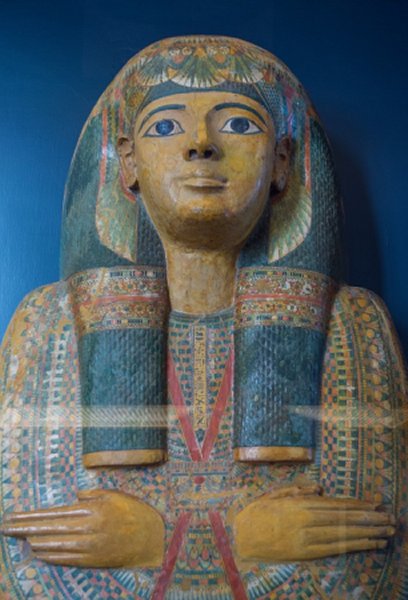Ancient Egyptians Knowledge Of Psychiatry – Importance Of The Sorcerer And The Mysterious Zar Dance
Ellen Lloyd - AncientPages.com - Ancient Egyptians were familiar with many branches of science. There is solid evidence they possessed advanced astronomical knowledge, mastered mathematics, and applied their expertise to monumental architecture.
Ancient people in the land of the pyramids were also acquainted with medicine thousands of years ago and could treat various diseases.
Credit: Public Domain
Ancient Egyptians knew much about prosthetic foot technology and produced functioning toe prostheses for amputated limbs more than 2,500 years ago. Many years ago, archaeologists made a sensational discovery when they found the 2600-year-old mummy of an Egyptian priest named Usermontu. X-ray revealed a metal screw near the kneecap of Usermontu. The metal screw connecting the mummy's thigh and lower leg naturally attracted worldwide attention because it was the first known example of ancient limb reattachment.
“Prehistoric physicians in Egypt had an impressive knowledge of the human body and its inner workings, as well as the treatment of illness and disease.
Egyptian medical papyri documented many diagnostics and medical achievements we still use today.” 1
In our modern society, we know that people may suffer from conditions that affect their thinking, feelings, mood, and behavior. These conditions can sometimes be severe and long-lasting to the individual and everyone in their surroundings.
Psychiatric disorders have existed as long as humanity, but were ancient civilizations familiar with mental illness?
Did Ancient Egyptians Recognize Psychiatric Disorders?
What did ancient Egyptians know about psychiatry and psychology? Did they recognize psychiatric disorders? If they did, how did they treat mentally ill patients?
The Ebers papyrus, the most famous plant medicine encyclopedia of ancient Egypt, reveals that it was widely understood that mental functions depend on the brain.
“The Egyptians believed that every personality had a part which was the 'sum' of the real or inner self. This explains their belief in the principle of the two names, one is known, and the other is hidden. The real name of an object was identified with the object itself.” 2
This line of thought reminds of Egyptian beliefs about the soul, according to which “the soul had three parts, the Ka, the Ba, and the Akh. These three spiritual elements found refuge in the body. Therefore, it was vital to keep the body intact after death and to equip it with the necessary items for life.” 3
Like many other ancient civilizations, Egyptians believed in the power of magic. By using a wide range of magical methods, Egyptians thought it was possible to avert harm or overcome feelings of fear. For example, if they wanted to cure a migraine, they had to transfer the pain from the individual to another object or a being. “The aching side of the head was rubbed with the head of a fish, to transfer the pain from the head of the sick to the head of the fish, using the fish somewhat as a scapegoat!” 2
A Psychiatrist In Ancient Egypt Was A Sorcerer
In ancient records, there was no mention of a person who specialized in mental diseases. Based on current knowledge gained by studying old texts, we can assume that the person we would today refer to as a psychiatrist was a sorcerer in ancient Egypt.
“The sorcerer was chosen with utmost care as he was going to be entrusted with dreadful secrets! The king himself in many instances, combined the two functions.
Credit: Public Domain
The future sorcerer was elected at birth either because he belonged to the sorcerer's clan or was of royal blood. He was then subjected to a strict model of life and numerous taboos, compelling him to hide his face by wearing a mask, discouraging his transparency, and enforcing his detachment and isolation.
The training of the sorcerer aimed at sharpening his psychic functions and equipping him with exceptional perception. The sorcerer had to convince people of his omnipotent powers, which meant that he had to know or follow certain rites. These may range from a simple gesture to a complete dramatization of the desired events. The peak is reached in the sacred drama or the magic religious dance. Hallucinogenic drugs sometimes facilitated this like mescaline, indicating the ancient Egyptian's knowledge of hallucinogens.
Mysterious Egyptian Zar Dance
The psychodrama still lives and is practiced in Egypt in the form of the 'zar dance.' The actual practice involves gathering a group of women believed to be possessed by spirits. The gathering is headed by a woman who acts as a leader and is called 'Kodia.' The Zar ceremony starts with traditional music and dance, performed by a hired group of dancers who then urge the women patients to take part in the dance until they reach a point of exhaustion.
The ancient Egyptian Zar dance is a healing dance still practiced today. Credit: Emad Nemati, CC BY-SA 4.0
The Kodia then approaches each individual and asks the devil inside her to leave his victim. The Zar cult has some similarities with the western concept of group psychotherapy. It is a group setting based on the notion of equal participation of the group members. It also provides a milieu for the expression of feelings through the dance.” 2
It may sound like bizarre practices to those who rely on science, but our ancestors' dependence on magic and other occult practices were normal.
Moving forward in time, we can still find people who practice what doctors would call unorthodox healing practices. The Polish Szeptunka or Whisperers, as they are called in English, are said to possess a magical healing gift. Modern medicine rejects their claims, but people still visit the Whisperers, hoping to be treated. You could be burned at the stake for using herbs not so long ago.
Today, many herbal supplements are used to treat diseases or maintain health.
Updated on September 16, 2023
Written by Ellen Lloyd – AncientPages.com
Copyright © AncientPages.com All rights reserved. This material may not be published, broadcast, rewritten or redistributed in whole or part without the express written permission of AncientPages.com
Expand for references- Sutherland - Egyptians Mastered Medicine Thousands Of Years Ago - AncientPages.com
- Mervat Nasser, Psychiatry in Ancient Egypt, Bulletin of the Royal College of Psychiatrists, Vol 11, December, 1987
- Sutherland - Why Were Ba And Ka Powerful Elements Of Soul In Ancient Egyptian Beliefs? AncientPages.com
More From Ancient Pages
-
 Ancient Hebrew Inscription Reveals Location Of Biblical Mount Sinai
Archaeology | Nov 21, 2019
Ancient Hebrew Inscription Reveals Location Of Biblical Mount Sinai
Archaeology | Nov 21, 2019 -
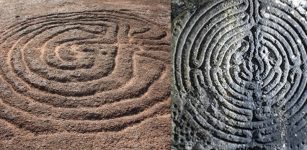 Intricate Mazes And Labyrinths: Mysterious Symbols Of Beauty And Confusion Or Communication Signals
Ancient Symbols | Jun 23, 2016
Intricate Mazes And Labyrinths: Mysterious Symbols Of Beauty And Confusion Or Communication Signals
Ancient Symbols | Jun 23, 2016 -
 Controversial Theory Suggests Atlantis Was In Scandinavia – Surprising Evidence Presented By Ancient Writer
Featured Stories | Sep 5, 2018
Controversial Theory Suggests Atlantis Was In Scandinavia – Surprising Evidence Presented By Ancient Writer
Featured Stories | Sep 5, 2018 -
 Mysterious Hockomock Swamp – A Vortex To The Unknown In Massachusetts?
Featured Stories | Oct 9, 2019
Mysterious Hockomock Swamp – A Vortex To The Unknown In Massachusetts?
Featured Stories | Oct 9, 2019 -
 Sacrificial Remains From The Iron Age Unearthed Near Aarhus, Denmark
Archaeology | Oct 14, 2015
Sacrificial Remains From The Iron Age Unearthed Near Aarhus, Denmark
Archaeology | Oct 14, 2015 -
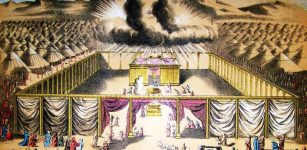 Ten Ancient Jugs And Shiloh May Reveal The Location Of The Biblical Tabernacle
Artifacts | Feb 6, 2019
Ten Ancient Jugs And Shiloh May Reveal The Location Of The Biblical Tabernacle
Artifacts | Feb 6, 2019 -
 Centuries-Old Hunt For Vanished Treasures
Artifacts | Nov 8, 2018
Centuries-Old Hunt For Vanished Treasures
Artifacts | Nov 8, 2018 -
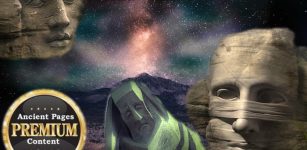 Home Of The Gods – Arrival Of Golden Ships – Part 1
Civilizations | Jun 12, 2018
Home Of The Gods – Arrival Of Golden Ships – Part 1
Civilizations | Jun 12, 2018 -
 Vikings Brewed Beer With Heated Stones – Old Tradition Popular In Germany, Finland And Baltic States
Archaeology | Dec 14, 2017
Vikings Brewed Beer With Heated Stones – Old Tradition Popular In Germany, Finland And Baltic States
Archaeology | Dec 14, 2017 -
 DNA From 10,000-Year-Old Scandinavian Chewing Gum Reveals Stone Age Diet
DNA | Jan 19, 2024
DNA From 10,000-Year-Old Scandinavian Chewing Gum Reveals Stone Age Diet
DNA | Jan 19, 2024 -
 First Scandinavian farmers were far more advanced than previously thought
News | Aug 23, 2015
First Scandinavian farmers were far more advanced than previously thought
News | Aug 23, 2015 -
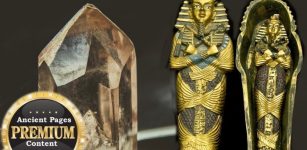 Lost Knowledge Of Energy And Crystal Technology In Ancient Egypt
Ancient Technology | May 17, 2019
Lost Knowledge Of Energy And Crystal Technology In Ancient Egypt
Ancient Technology | May 17, 2019 -
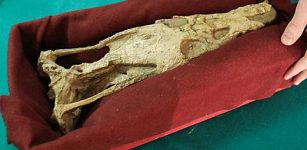 More Than 1000 Bones Of Extinct Predators From 240 Million Years Ago – Found In Upper Silesia, Poland
Fossils | Dec 11, 2023
More Than 1000 Bones Of Extinct Predators From 240 Million Years Ago – Found In Upper Silesia, Poland
Fossils | Dec 11, 2023 -
 Evidence Of Ancient Lakes In The Sahara Desert Discovered
Archaeology | Nov 5, 2022
Evidence Of Ancient Lakes In The Sahara Desert Discovered
Archaeology | Nov 5, 2022 -
 Rare Discovery: Giant Stone Artifacts Found On Ice Age Site In Kent
Archaeology | Jul 6, 2023
Rare Discovery: Giant Stone Artifacts Found On Ice Age Site In Kent
Archaeology | Jul 6, 2023 -
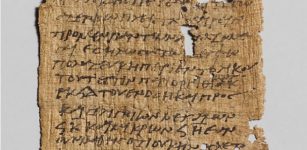 Papyri Was Still In Use After The Arab Invasion In Egypt
Archaeology | Jul 14, 2020
Papyri Was Still In Use After The Arab Invasion In Egypt
Archaeology | Jul 14, 2020 -
 On This Day In History: King Louis XVI Of France Was Put On Trial For Treason – On Dec 11, 1792
News | Dec 11, 2016
On This Day In History: King Louis XVI Of France Was Put On Trial For Treason – On Dec 11, 1792
News | Dec 11, 2016 -
 What Was On The Menu For Stonehenge’s Builders, 2500 BC? Milk, Yoghurt And Cheese Only Eaten In Exclusive Ceremonies
Archaeology | Oct 14, 2015
What Was On The Menu For Stonehenge’s Builders, 2500 BC? Milk, Yoghurt And Cheese Only Eaten In Exclusive Ceremonies
Archaeology | Oct 14, 2015 -
 Did Neanderthals And Modern Humans Meet In The Czech Republic 50,000 Years Ago?
Archaeology | Jun 17, 2017
Did Neanderthals And Modern Humans Meet In The Czech Republic 50,000 Years Ago?
Archaeology | Jun 17, 2017 -
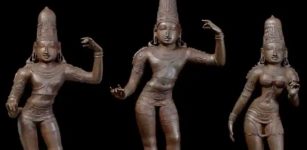 Stolen Antique Tamil Nadu Statues Have Been Returned By Britain To India
Artifacts | Sep 23, 2020
Stolen Antique Tamil Nadu Statues Have Been Returned By Britain To India
Artifacts | Sep 23, 2020


